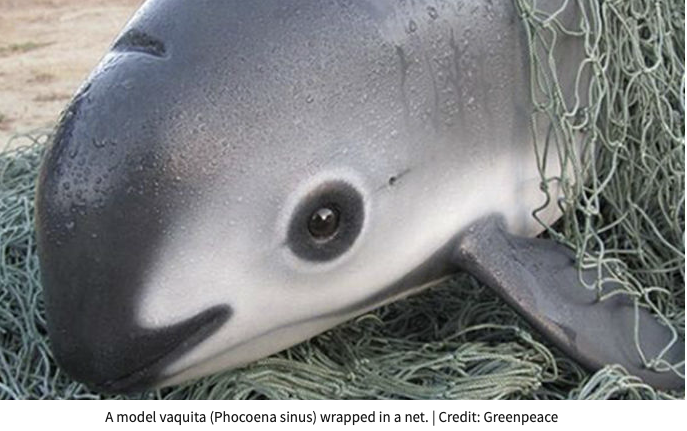Here is a first hand account by WildiZe’s CITES Team member Cathy Cooper, about being in the room during the crucial vote for the critically endangered Vaquita.
As expected, CoP18 document 89 regarding the Totoaba, and therefore the survival of the critically endangered Vaquita, was heavily discussed in Committee Room II.
The US started the discussion with, “We are concerned that illegal harvest and trade of Totoaba continues, unabated, despite consistent pressure from the International community. Given our role as a transit country in this illegal trade, we are committed to taking all necessary action.” The US delegates then continued with a number of proposed changes to the 24 page document that had been prepared by the Secretariat. The additional edits were offered to further strengthen and clarify recommendations directed to Mexico and other parties. The US did not recommend funding the study that was proposed in the document stating, “The United States is concerned that investing time and money for studies, will further delay implementation of the recommendations already provided. We believe it is well known what steps Mexico needs to take to control illegal harvest and trade.”
The EU took the floor and did want to fund the study, then Israel took the floor and wanted a pared down version of the study.
The Chair, Craig Hoover from the US, proposed that the US, Mexico, Israel and the EU take the 2 hours during the lunch break to talk through the extensive changes offered up by the US to see if they could all come up with an agreement. China and Liberia both asked to join the lunchtime discussion.
Returning from lunch, the Chair then read the proposed changes to Document 89. The parties had made considerable progress reaching a number of compromises. There was vast agreement in strengthening national policies, law enforcement measures to prevent and address illegal trade of Totoaba, support for gillnet retrieval programs, and financial and in-kind support to implement a study before the 73rd meeting of the Standing Committee.
All of the language was agreed upon with the exception of item 18DD paragraph B in the draft decision directed to the Standing Committee.
Directed to the Standing Committee
18.DD The Standing Committee shall:
- a) review and assess any information and recommendations submitted by the Secretariat in accordance with Decision 18.CC;
- b) based on its assessment, and if not satisfied with progress in the implementation of Decisions 18.AA and 18.BB, determine if compliance measures should be adopted in accordance with Resolution Conf. 14.3, which may include consideration of recommendations to suspend trade in specimens of CITES listed species; and
- c) make further recommendations as needed to Parties and to the Conference of the Parties at its 19th meeting.
At that point the floor was opened to comments from parties. Mexico took the floor to oppose paragraph B. The US then took the floor wanting to defer to the current language recommended by the Secretariat as she had benefited from her first hand observations on the matter.
EU supported the language by the secretariat.
Canada supported Mexico’s request for different language.
Sea Shepherd Legal then took the floor with an intervention (attached).
The Chair recognized there was a strong difference of opinion regarding 18DD and then referred to the practice that had been used throughout Committee II during this CoP that when there was substantial support for what has been proposed in the document, even when there is not consensus, that the proposal is accepted.
Mexico asked for the floor and then requested further consultation before accepting the proposal. The chair again tried to move forward asking Mexico’s delegates if they felt there was a need to vote on this issue.
(NOTE: Need any background here? – that they try to reach a consensus without holding a vote)
Mexico asked for the floor again still very upset about the language regarding implementation and felt they were being judged unfairly. The secretariat responded that the language was standard and not directed towards Mexico.
Mexico took the floor 3 times to argue against stated that “It being standard language is not sufficient “
“With everything that the secretariat has just mentioned, we think that the explanation about it being standard language is not a sufficient explanation. We believe this is not the case here Mexico is implementing all measures of the convention therefore we believe what we are suggesting is broad enough and within the mandate of the standing committee.” Basically stating they were struggling to understand why their language wasn’t acceptable and asked to launch an appeal.
In an effort to bring the proposal to a conclusion, the Chair offered the floor to the CITES Secretary-General, Ivonne Higuero.
Higuero offered to change the language to:
- based on its assessment, and if not satisfied with timing and progress in the implementation of Decisions 18.AA and 18.BB, make any appropriate recommendations within the mandate of the standing committee in accordance with Resolution Conf 14.3
Dropping:
which may include consideration of recommendations to suspend trade in specimens of CITES listed species
Mexico took 2 minutes for consultation with their delegates, then accepted the Secretariat’s language. When I consulted with the Sea Shepherd legal team following the decision, they believed that overall the Secretariat’s language appeared to be a positive step, stating there is a planned course of action for compliance measures.
At a screening of Sea of Shadows a panel ensued with the director, Richard Ladkani, basically saying that Mexican enforcement needs to take out the Chinese middlemen that run the business of this illegal trade
